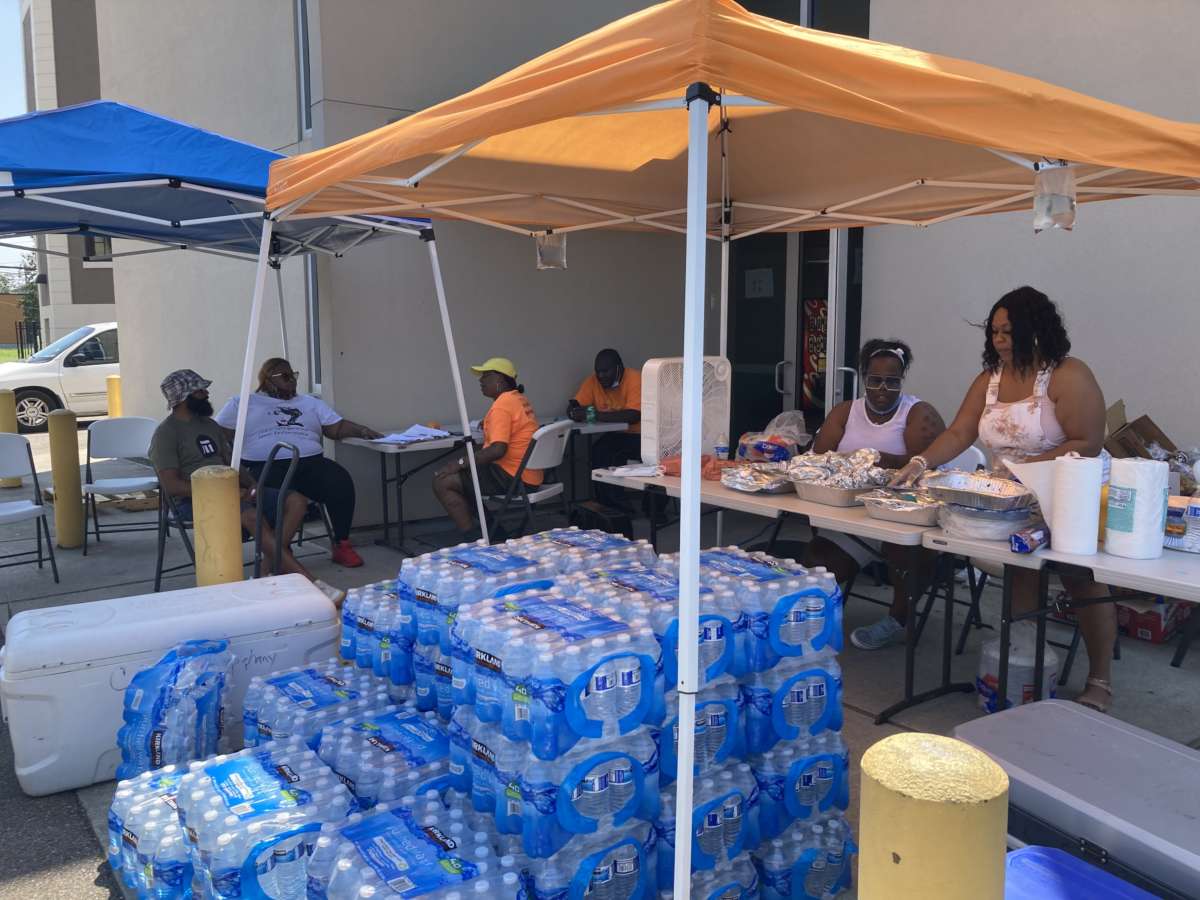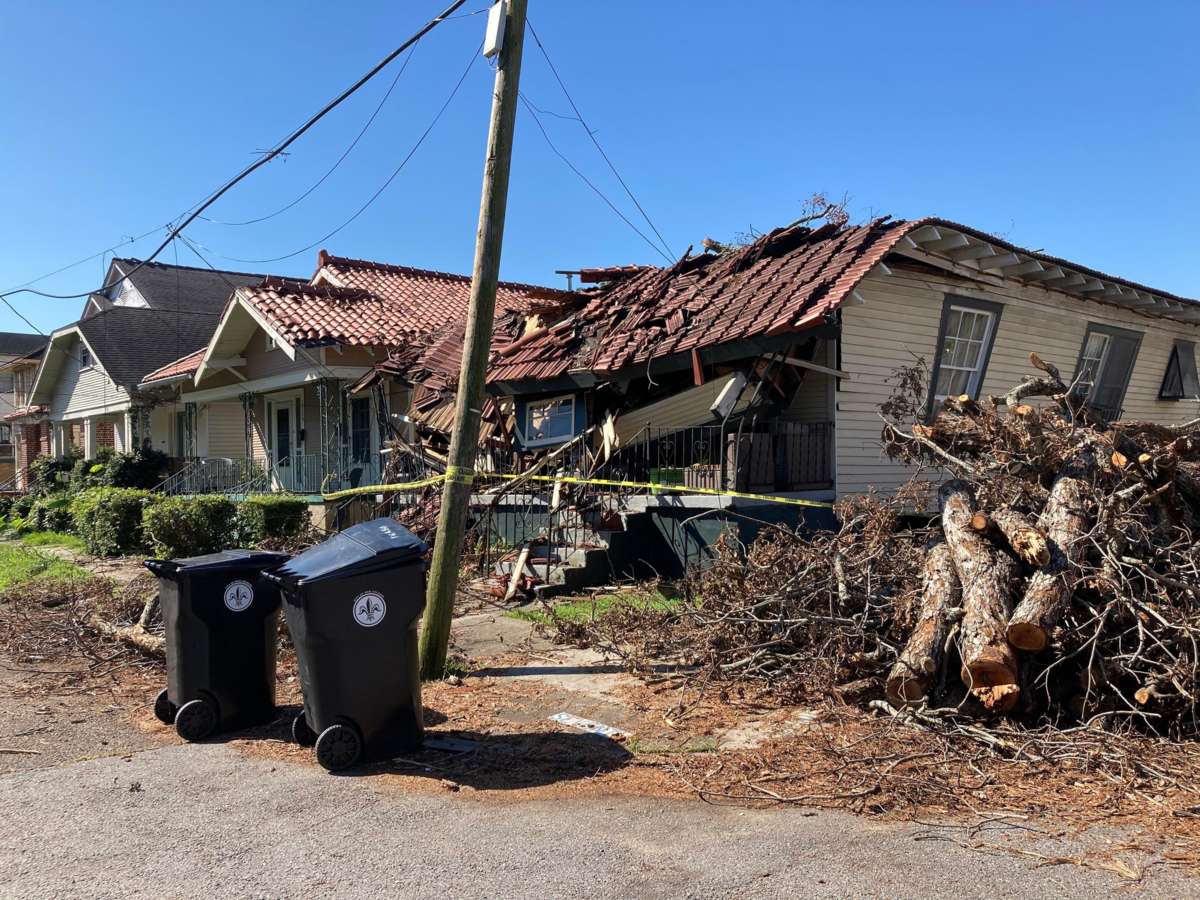NEW ORLEANS, LOUISIANA—Residents and advocates were already bracing for a wave of hardship and home evictions across an economically vulnerable region when Hurricane Ida slammed into southeastern Louisiana last week, destroying homes and businesses and displacing tens of thousands of people during a COVID surge. The storm left entire communities without power and clean water for over a week and countless workers without a paycheck as rent came due and federal pandemic supports dissipated.
For Louisianans in Hurricane Ida’s path, the last-minute decision to evacuate their homes or shelter in place for the deadly storm was only the beginning. After the storm passed came days of sweltering heat without power, the scramble to put tarps on leaking roofs, the days of waiting for the phone and internet service needed to apply for federal disaster relief that many still have not received. For those who evacuated, the costs of living on the road piled up alongside the anxiety of deciding when to return to disrupted lives and damaged homes.
Facing an intensifying housing crisis, a coalition led by a tenants’ union in New Orleans is now demanding direct cash assistance for struggling renters and a new moratorium on evictions until all of the federal relief for those who fell behind on rent during the pandemic is distributed. As Congress debates the $3.5 trillion budget reconciliation bill, climate justice groups across the Gulf South are calling for bold investments in green infrastructure, renewable energy and the people living in front line areas to prepare for future storms that are only growing more frequent and powerful with a warming planet.
“Climate disaster planning and recovery must be more equitable and it has to be more sustainable, and climate solutions must come from the front lines,” said Colette Pichon Battle, executive director of the Gulf Coast Center for Law & Policy, during a call with reporters on Thursday.
Activists on the ground fear public concern for the disaster-struck region is already waning, leaving people in a state hit hard by the COVID pandemic vulnerable to widespread hunger and houselessness. National attention quickly moved to the East Coast as Ida dumped heavy rains and caused widespread flooding in New York and New Jersey that left dozens of people dead.
Madeline Peters, an organizer with the New Orleans Renters Rights Assembly, the tenants’ union demanding a new pause of evictions, said southeastern Louisiana was already facing a crisis of housing and economic insecurity before the storm hit.
“Now that we’ve had a pandemic, now that we’ve had a storm, everybody is behind,” Peters said in an interview after the tenants’ union met on Wednesday. “It’s not just a loss of electricity, it’s a loss of work that further destabilizes households and people.”
In the lower-lying and coastal parishes that took the brunt of the storm, the recovery could take years, according to August Creppel, principal chief of the United Houma Nation. At least 11,000 of the Houma tribe’s 19,000 members living across the five parishes hit hardest by the storm have been affected. Creppel, a firefighter who worked day and night over the past two weeks providing disaster relief, said the United Houma Nation has spent decades fighting for federal tribal recognition and the enhanced support and disaster relief that comes with it.
“Some of our people have half of a house, some have no house to go home to,” Creppel told reporters on Thursday. “This is not a quick fix. What we are dealing with is for years.”
Back in New Orleans, organizers fear a wave of evictions will erupt after an order from the state’s Democratic governor pausing legal proceeding expires on September 24, further displacing people who survived the storm or attempt to return after evacuating.
Many people in the Crescent City and across southeast Louisiana work low-wage jobs in the service, tourism and retail industries and could be without work or a paycheck for weeks. Louisiana cut off pandemic unemployment benefits in late July, and the Supreme Court struck down an already weak federal moratorium on evictions just days before the storm. Less than 14 percent of the $248 million in federal emergency assistance for home renters in Louisiana has been distributed so far, compared to 67 percent in Texas and 100 percent in New York, according to the National Low-Income Housing Coalition.
On Thursday, the New Orleans Renters Rights Assembly released a list of demands calling on the city to keep its eviction court closed until all of the federal rental assistance is distributed, and at least until the end of year. The tenants’ union said an additional $500 million in rental assistance is needed across the state. Last summer, protesters blocked and shut down the city’s eviction court after local and state moratoriums on evictions expired, an action that made national headlines and put pressure on federal policymakers to implement a national eviction moratorium.
Activists say the rental assistance program, which is administered by the state in rural areas and by city officials in New Orleans, is in need of an overhaul. Instead of requiring renters to produce onerous amounts of documentation and making relief payments to landlords, housing justice activists in New Orleans and beyond say people who fell behind on rent during pandemic lockdowns should receive assistance in cash, a model that has already proven successful in other communities. The tenants’ union says the city must also provide a dedicated, multilingual staff to help people with disabilities apply for rental assistance and disaster relief.
“We need the government to focus on aid and follow through in a way that is not just reactionary but sustainable,” Peters said.

The tenants’ union is also demanding the “right to return” for all residents displaced by the storm, including renters who live in damaged homes. Even if legal evictions are temporarily halted, organizers fear landlords will neglect badly needed repairs, forcing people to either live in uninhabitable homes or go someplace else. Louisiana has few legal protections for renters, who can receive an eviction notice after withholding rent for any reason, even if that reason is a giant hole in the roof. “Invisible evictions” that were never challenged in court were common in New Orleans and across the country when the federal eviction moratorium was in place.
Echoing multiple climate justice groups, the tenants’ union is also demanding a quick transition to renewable energy for a region that has long been dominated by the fossil fuel industry. At least 350 oil spills were reported in southeast Louisiana and the Gulf of Mexico after Ida, according to reports. The days spent without electricity in the hot sun prompted more urgent calls for solar energy, an obvious solution for maintaining power for residents during a natural disaster. If more homes and businesses had solar panels connected to community microgrids and power banks, thousands of people could have kept refrigerators and air conditioners running, which can save lives during heat waves and other climate disasters.
Jennifer Crosslin, a regional organizer with Southern Communities for a Green New Deal, said policy makers should take their cues from Gulf South communities such as New Orleans. There is a long tradition of collective disaster response in the Gulf South, where activists and have spent years forging connections through organizing and mutual aid. These coalitions are now coalescing around the Green New Deal, a framework for building climate resilience and renewable energy that is necessary for survival in the era of climate disasters.
“Let the people who are rooted in place — and love in abundance — lead this nation to the kind of transformation we know we need, for our sake and for all of ours,” Crosslin said told reporters on Thursday.
New Orleans residents are still clearing debris and repairing damaged homes after most of the city spent over a week without power. Many households emptied their refrigerators during the power outage, and the smell of garbage hangs in the summer air. In the Seventh Ward, a working-class neighborhood about a mile from the French Quarter, cars lined up on Thursday to receive water bottles and a hot meal from volunteers with Step Up Louisiana, a group that fights for economic and racial justice. Standing over a grill full of barbecued chicken, Ben Zucker, the group’s co-director, said hundreds of people show up each day.
“The pandemic was the first hit, and now this,” Zucker told Truthout. “People are already hungry. We see this after every storm.”
Federal Emergency Management Agency (FEMA) relief has not reached many Louisiana residents, while others have received payments of $500 to $1,000 for damaged homes and other costs. This reporter attempted to file a claim online three times last week, but the FEMA website crashed each time before finally working on Tuesday, more than a week after the storm. Others spent hours waiting to file a claim over the phone. Disaster “food stamps” meant to replace spoiled food have yet to be approved for those who are not already enrolled in the state’s Supplemental Nutrition Assistance Program.
Kisha Edwards, a member of Step Up Louisiana’s political committee, said the response from FEMA has been slow, and members of her community are still waiting for relief. Their applications for FEMA funds are pending, and Edwards doesn’t understand why. As she packaged hot meals to be given away, Edwards explained that volunteering after a storm is part of life in Louisiana.
“I’m here to give back, because this is what we do,” Edwards said.
Join us in defending the truth before it’s too late
The future of independent journalism is uncertain, and the consequences of losing it are too grave to ignore. To ensure Truthout remains safe, strong, and free, we need to raise $33,000 in the next 2 days. Every dollar raised goes directly toward the costs of producing news you can trust.
Please give what you can — because by supporting us with a tax-deductible donation, you’re not just preserving a source of news, you’re helping to safeguard what’s left of our democracy.
